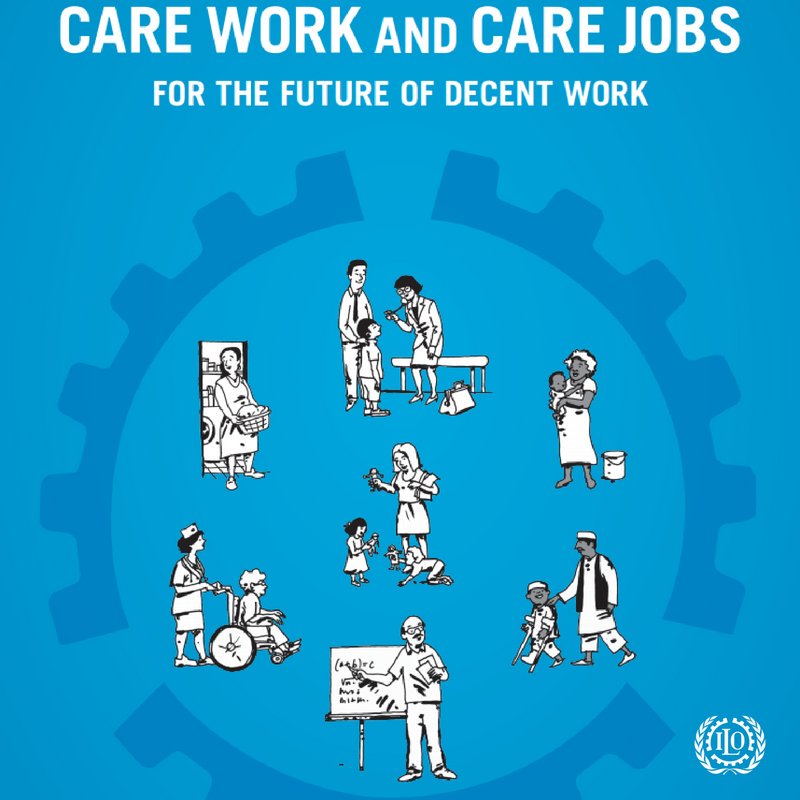
Appreciating care work is one of the best ways of achieving social equality between men and women.
by Abigail Muscat
Collage by the IotL Magazine
Dedicated to my mum: the best care worker of all.
[dropcap]A[/dropcap] mixture of the industrial and feminist revolutions has meant that there are more women in the workforce than ever before. Despite this, women around the world still do the majority of so-called ‘care work’. Many initiatives exist to get more women into the labour market but little has been done to recognise that societies around the world depend on care work such as the care of children, the elderly, housekeeping and cooking.
Far more men still form part of the labour force than women. Globally in 2015, 77% of men formed part of the workforce compared to 50% of women. Women, however work longer hours. On average, women work 30 minutes more a day in developing countries and 50 minutes more a day in economically developed countries. The problem with this is that significant amount of labour (around 3–4 hours a day) goes unpaid.
This can result in a number of issues, namely a lack of financial independence and reduced pensions. This is not just an issue on a global scale, even within the EU, the pension gap between men and women stands at 35.7%. This means that women are paid almost 40% less than men when getting their pensions. My own mother for example, stands to earn far lower pension than my father despite working as many, if not more, hours doing the valuable work of raising two children and supporting them through their education, saving the government thousands in state-funded child-care costs.
Women are paid almost 40% lower than men when getting their pensions.
In Malta, this needs to be taken seriously. According to Malta’s reporting to the 2018 European Semester, the gender pay gap for pensioners above 65 remains one of the highest in the EU. This places women particularly at risk of poverty in their old age, which is particularly marked by higher risks of poverty across genders.
![]()
The overwhelming demand of women to both go to work and still do the bulk of care-work makes it challenging for women to balance work and family life. This is why at the crux of this issue is maternity, paternity and parental leave.
Glossary
Maternity leave: ‘leave generally available to mothers only (except in a few cases where part of the leave can be transferred to other carers under certain circumstances). Usually understood to be a health and welfare measure intended to protect the health of the mother and new-born child, to be taken just before, during, and immediately after birth’.
Paternity leave: ‘leave generally available to fathers only, usually to be taken soon after the birth of a child and intended to enable the father to spend time with his partner, new child and older children’.
Parental leave: ‘leave available equally to mothers and fathers … generally understood to be a care measure, intended to give parents the opportunity to spend time caring for a young child; can usually only be taken following the end of maternity leave’.
Source: 12th International Review of Leave Policies and Related Research 2016, International Network on Leave Policies and Research.
The trends are encouraging, showing an increase in the uptake of both maternity and paternity leave globally. However, much is left to be desired; considering that less than half of countries in the world meet the basic standards set by the International Labour Organisation. Thus, even when incentives exist, societal expectations can keep men back from making use of paternity and parental leave.
Data from 2010 shows that in the EU, only around 2.7% of men made use of parental leave. Often there was a relationship between women’s lack of participation or dropping out from the labour force and poor quality childcare services. This shows that parental leave is at the heart of women being able to earn an income.
Data from 2010 shows that in the EU, only around 2.7% of men made use of parental leave.
The EU Commission’s Work-Life balance package attempts to address this by setting a minimum of two weeks or 10 working days of paternity leave across the EU. This would be a great improvement for Malta where the maximum leave that a new father is allowed to have on the birth of his child is 2 days. However, this has been met with opposition from Maltese employers. While acknowledging that many businesses are small-to-medium enterprises, it should be understood that paternity leave is as essential to the overall welbeing of society (as well as that of individual employees) as maternity leave. The opposition towards something so basic means that a great change needs to be made.
All this does not just mean that women should be recognised and rewarded for their work. It also means a far more fundamental shift—care work needs to be seen as something belonging to both men and women.
This does not only mean achieving full equality in the share of tasks between care work and other types of work. It also means that men who choose to dedicate their lives to care work, either through becoming stay-at-home husbands and fathers, or through being paid care workers such as nurses in elderly homes are respected.

This respect should not take the form of additional reward because a man is doing ‘women’s work’. It should reach a point where it becomes normalised and until then men should be encouraged to not take heed of societal pressure to act ‘like a man’ if staying at home playing with their children is what they want to do with their life.
![]()
A second shift need to be economic and financial as much as it needs to be cultural. Care workers around the world who occupy a diversity of occupations, from education, health to social work, are plagued by precarious, illegal, underpaid work. Despite doing some of the most important jobs for the welfare of society, many care-work sectors are plagued by little pay and overwork.
A lot of these jobs are performed by women (143 million care workers are women, as opposed to 72 million men) and it’s often the case that any sort of job that is seen to as ‘women’s work’ is often paid less, irrespective of qualifications, and labour involved. Construction work, for example, tends to be much higher paid, despite the fact that a lot of care workers require much higher qualifications and are always in high demand.
Construction work for example tends to be much higher paid, despite the fact that a lot of care workers require much higher qualifications and are always in high demand.
A lot of this has to do with the fact that much of the work done in the care sector is also present in the domestic sphere. This means that governments do not believe that anything in the domestic sphere has any economic value (Similar to the essential services provided by the environment, like breathable air, these are only ‘externalities’).
However, care work can and should be a shared responsibility. For example, in 2006, Spain passed the Ley de los Dependientes which allowed for people to receive financial support to care for their dependents, irrespective of whether they did it themselves or hired a professional carer. Sadly, the Partido Popolar scrapped this, despite the fact that it was creating jobs.
This is part of a wider phenomenon of narrowing down the meaning of what it means to do valuable work. Much of the push behind the social rights like the right for women to work and the right for women to get maternal leave has a lot to do with increasing productivity. Work can be a way of participating in society, achieving personal meaning through contributing to a wider societal goal. With narrower definitions of work, where value is equated with higher productivity irrespective of its relation to increasing benefits to society, few people find meaning in their work.
Much of the push behind the right for women to work has a lot to do with increasing productivity. However, work can and should be a way of participating in society.
But examples of policies that try to remunerate work beyond traditional employment do exist. In Belgium for example, work in the non-profit sector is subsided and financial support from the state can be given to people taking leave to undergo training, take care of the elderly or take political office. Under some schemes, voluntary work and artistic work is also supported.
All this forms part of a wider discussion on the future of work. Important demographic and societal changes are occurring; ageing populations are requiring more care while traditional definitions of work will be challenged by automation. These changes are happening quick, but our ability to shake off our concepts of gender and the division of labour between men and women is slow. However, there is hope. Ultimately this will benefit everyone, including all the fathers who wish they were playing with their kids rather than reading work emails.
Leave a Reply